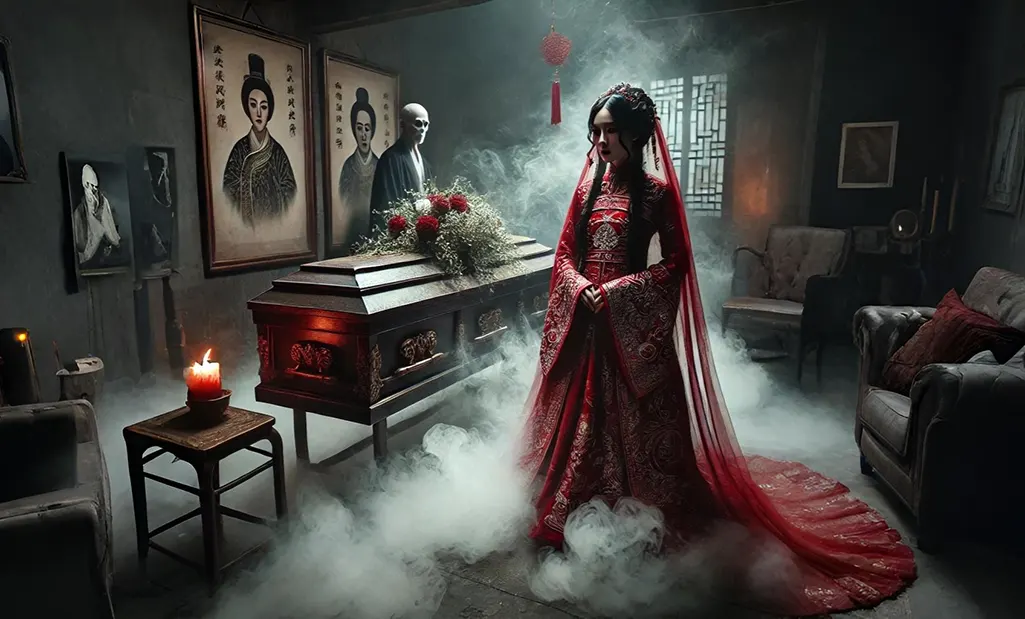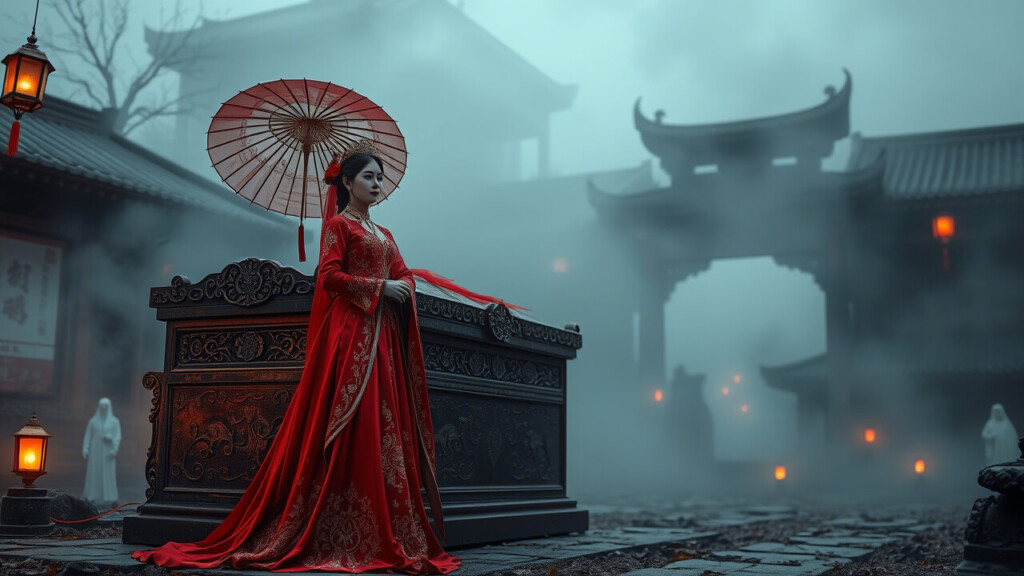Have you ever heard of love stories that transcend the boundary between life and death? In the world of ghost marriage (Yin Hun, 阴婚), love is not just a lingering memory or a whispered prayer—it takes shape in a chilling ceremony where the living weds the dead.
Picture a solemn ritual where the bride or groom is adorned in an ornate wedding outfit, standing beside a memorial portrait and a coffin. A scene that is both poignant and eerie, blurring the line between devotion and dread.

But is this truly a testament to eternal love, or merely a relic of ancient superstitions? And what happens if someone dares to defy such an unholy union—will they truly suffer an unsettling fate?
The Spiritual Belief: Why Does Ghost Marriage Exist?
Ancient traditions suggest that those who die unmarried become wandering souls, trapped in the shadows of the afterlife. Unable to find peace, they may return to their families, bringing misfortune, illness, or even catastrophe.
To appease these restless spirits, families conduct ghost marriages—rituals meant to unite lonely souls in the underworld. A typical invocation during such a ceremony might go like this:
“You departed too soon, never knowing the sacred vows of marriage. You now drift alone in the darkness, yearning for companionship. We offer you this union so that your soul may find solace in the embrace of another.”
A traditional spectral wedding includes:
- A ceremonial funeral – Two grieving families weep together, mourning yet fulfilling an obligation.
- A grand offering – Banquets, paper money, and even paper effigies of servants and houses are burned to provide for the deceased in the afterlife.
- The most crucial step – The remains of the deceased bride are exhumed and placed inside the groom’s grave, sealing their ethereal bond for eternity.
Believers fear that without this sacred union, the forsaken spirit will linger and torment the living. Some even forbid the burial of unmarried sons in ancestral cemeteries, fearing their unfulfilled souls will bring supernatural misfortune upon future generations.
Social Pressure and the Fear of Malevolent Spirits
In China, parents traditionally play a dominant role in choosing their children’s spouses—even in death. For many, ghost marriage is not just a spiritual safeguard, but also a moral duty. Neglecting this obligation is believed to invite divine retribution from the world beyond.

Take the tragic case of Li Yun. After her fiancé’s sudden passing, his family coerced her into marrying his corpse. She resisted at first—pleading, crying, even attempting to flee. But the ominous warnings haunted her:
“If you refuse, his spirit will never rest and will follow you forever.”
After the spectral wedding, her reality warped into an endless nightmare. She felt unseen presences lurking in her home. Footsteps echoed in the dead of night. A shadowy figure would stand near her bedside. Had she truly escaped his grasp, or had the ritual bound her to something inescapable?
Many believe that denying a ghost marriage invites supernatural consequences. Reports of eerie occurrences include:
- In Shanxi Province, a family refused to conduct a ghost marriage for their deceased son. Soon after, they suffered a series of strange accidents. Convinced their son’s vengeful spirit was responsible, they eventually submitted to the ritual.
- In Shaanxi Province, a skeptic neighbor destroyed a temporary ghost marriage altar, dismissing it as mere superstition. Within weeks, he suffered a freak accident and perished under unexplained circumstances.
Yet, not everyone bends to tradition. Wang Jun, a 28-year-old man from Shanxi, rejected the idea of marrying his deceased fiancée after she died in a car crash. His family warned him:
“If you refuse, she will linger in this world, searching for you.”
Wang Jun stood firm, and five years later, he remains alive and well. However, he admits that for years, bizarre dreams and an eerie sense of being watched never completely faded.
Such stories of phantom retribution and unseen forces have cemented ghost marriage in folklore. Whether one believes in the mystical consequences or not, its influence continues to shape lives—even leading to grotesque crimes in the modern age.
The Dark Side of Ghost Marriage: Black Market Corpses and Grisly Crimes
The belief in ghost marriages is not merely a spiritual tradition—it has also led to disturbing real-world consequences. The demand for “ghost brides” and “ghost grooms” has fueled a chilling black market, where the value of a female corpse has skyrocketed over the years.
The price of a female corpse on the black market has surged dramatically. In 1990, it ranged around 5,000 yuan, but by 2016, it had soared to 150,000 yuan. The demand became so intense that some were willing to desecrate graves—or even commit murder—to procure a body (According to ABC News).
In 2016, a man named Ma Zhonghua in northwestern China murdered two mentally disabled women, selling their bodies for 40,000 yuan each to families seeking ghost brides. (BBC, 2016)
When Ma was apprehended, police discovered a corpse in his vehicle. Further investigation revealed detailed records of illicit corpse transactions. Some relatives of the victims later reported hearing wailing voices at night, as if the spirits of the slain were crying out for justice.
In Shanxi Province, 14 female corpses were stolen from a village cemetery. Locals suspect grave robbers sold them for ghost marriages. Some families even claimed they heard spectral cries drifting from the disturbed graves. (The Guardian, 2016)
Love or a Curse?
Is ghost marriage truly a way to bring peace to a wandering soul, or is it merely an illusion born from lost spirits? Those who resist often encounter mysterious misfortunes—but are these mere coincidences, or does a curse from the otherworld truly exist
Ask yourself:
If you were to stand in the way of a ghost marriage, would you dare to face the terrifying consequences that may follow?
In reality, every country has its own unique customs, reflecting the beliefs and values of its people. However, perhaps it is time to ask: Are rituals like ghost marriage still relevant in modern society?
For Buddhists, there are prayers for the dead; for those who believe in spirits, exorcists and shamans offer their services. And for atheists, could these fears be better addressed through psychology or modern medicine?
Ultimately, the biggest question remains: How do we balance preserving cultural traditions while protecting the living from undue spiritual pressures?
